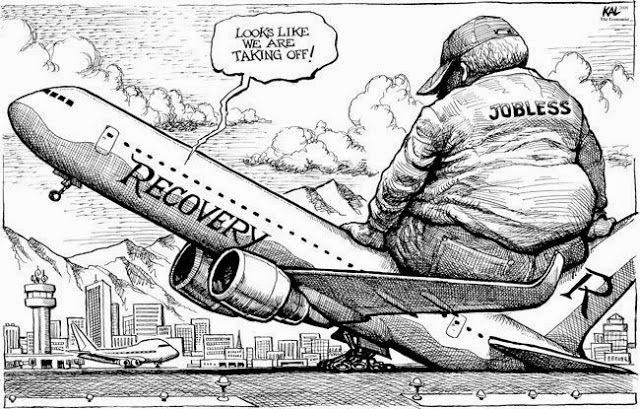A couple of days ago the
European Central Bank's Quantitative Easing (QE) entered the game. We all knew it was coming: the last two months have been a continuous "Mario Draghi will buy the European national treasury bills", "ECB buying European T-bills soon", "ECB financing governments" and so on.
Then, finally, the thing happen: the ECB will buy for some years the European T-bills of the secondary market, proportionally with the size of each European country, for top 60 BLN of euros per month.
Many reactions have been registered: generally, the main European newspapers and tv channels titled something like "SuperMario did it",
painting the operation as a success in terms of politics (the German attitude for non-intervention of Central Banks has been consistently broken for the first time) and economics (the huge amount of resources the ECB put on the table). The rest of the world shows more or less similar judgements besides some exceptions, and I'm part of that.
It looks like a matter of logic. The European governments have a budget problem: the internal demand it's shrinking progressively > the companies close > the governments get less VAT and other taxes > the governments have to compress the public expenses cutting investments and services but these cuts are not enough > nobody wants to buy T-bills of a collapsing State and the interest rates on these rise, making the whole thing more expansive > the ECB buys massively these certificate, the governments have the money and the interest rates goes down.
Let me explain another kind of lucid logic: my grandfather whistles > the train whistles > my grandfather is a train. This is a syllogism, one of the first form of logic thought. Many centuries later, Galileo Galilei found that
logic is a standard not robust enough to demonstrate the truthfulness of a statement or phenomenon. An argument is "scientific" when it's both logic
and demonstrated, on the empirical side, on the base of a certain hypothesis.
As well as the grandfather thing, the chats around the European QE are not correct at all.
The European QE consists in the single Central Banks of the Eurozone - the ECB is just a trust of European banks and doesn't do anything directly - buying T-bills for the mentioned amount of billions of euros per month. The single CB will buy those T-bills
from private banks (the "secondary market"). The whole operation has the aim to give these banks - which are completely rotten and full of debts because of the thousand of billions of toxic assets they have in their own portfolio -
money. The ECB then expects these banks to start lending money again to the companies and, so, "stimulating the internal demand" (raising your wages, hiring your unemployed friends, moving the economy).
Here's what's wrong in this prediction: banks progressively stopped lending money to the "real economy" during the last years (the "credit crunch")
NOT because they don't have money to lend but because banks does it when these two conditions apply:
(1) the return of the amount lent is quite secure and,
if this first step is respected,
(2) the financial performance X% of such operation is expected to be higher, for example, than the earnings you can have investing the same money on a stock market index which shares the same risk rate.
Since almost all around the Eurozone the condition #1 - the most important - is very aleatory and the #2 barely exists, the banks don't lend money.
No matter the CEOs behaviors, the corruption rate, the obscene value of corporate bonus and many other things we hear every day as presumed responsible for the economical crisis.
On the other hand, even if this abundance of liquidity generates so irrational expectations (lending money to an economy where companies close and people get fired?) that will make the banks lending money again, that wouldn't be enough. In this hypothetical field, Bloomberg talks about the necessity of 3,000 BLN of euros to change the destiny of Europe. The Draghi's "bazooka" is around 1K - and, anyway, I already explained you why this is a definitely hypothetical scenario.
Again,
the only certain consequence of the QE is that the banks will buy soon and for long time more governmental T-bills then in the recent past. This, according to many "experts" - I don't know "experts" of what - will have positive effects because if the banks buy more certificates, the governments will pay back on them, in the future, lower interests than before and so the public debts will grow slower then before.
The last chain of cause-effect description is correct, but there's more. If the interests rate in our region get smaller than now - and we're already very close to the zero - the interest rate on the European deposits will decrease too, and probably will even disappear. Why Nordea should give you the 0,5% on a deposit when the cost of money is 0,2%?
This will ruin an entire generation of savers and, more important, will automatically make you move a great part of your money from your deposits (risk: zero) to the stock market (risk: the moon) because that is the only place where you can still have a discrete gain.
In conclusion, the actual QE is, at the end, inflating the new speculative bubble.
A bubble 100% European, this has to be clear, so big that it's possible to see it from the deeper space. And we'll be the next victims.
Do you want to understand more about the thing? Take a look at the youtube seminar down here and take you time. It took years to me. And stop watching economics news on tv.
















 I am Domenico La Tosa, an IT analyst, webdesigner, fixer, Intel and ASUS expert, Windows10 insider.
I am Domenico La Tosa, an IT analyst, webdesigner, fixer, Intel and ASUS expert, Windows10 insider. My coworker, Alessia Curcio, is a graphic designer, web content manager and nerd. You can find her
My coworker, Alessia Curcio, is a graphic designer, web content manager and nerd. You can find her 

